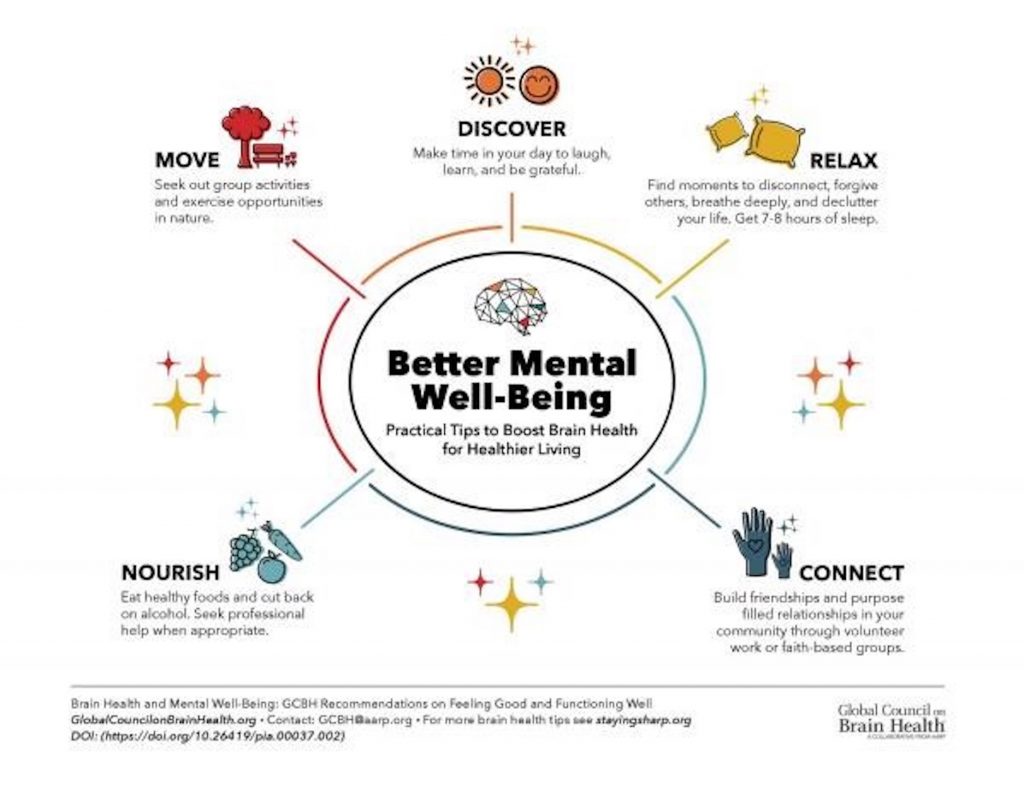
Ron Mori
How are you feeling? Not just physically, but mentally. You know, that 1988 hit song by Bobby McFerrin, “Don’t Worry, Be Happy?” I try to follow that advice as much as possible, and it turns out it’s good advice, not just a greeting card cliché!
According to a new report issued by the Global Council on Brain Health, a positive sense of mental well-being is related to better brain health among older adults. The good news is that research shows our sense of mental well-being tends to increase after middle age, and there are steps we can take to help improve it, regardless of age.
Mental well-being is defined as a person’s experience of feeling good, functioning well and coping adequately with life’s challenges. Functioning well means being able to think and reason sufficiently to conduct daily activities, but also the ability to function socially with others and cope with life’s challenges.
“Many things can affect our sense of mental well-being, like our genetics, personality, life experiences, environmental factors and our personal relationships,” said Sarah Lenz Lock, AARP senior vp for policy and GCBH executive director. “But mental well-being is something that we can improve and maintain as we age by living a healthy lifestyle, learning how to manage stress and anxiety and engaging in things that give us a sense of purpose.”
Based on the available evidence, the GCBH says that:
Greater mental well-being is associated with reduced risk of dementia.
Multiple medications taken together can negatively affect mental well-being and cognitive health.
It is possible to improve your sense of mental well-being, regardless of age or physical condition.
Relating well to others and having good emotional control are key to mental well-being.
 The GCBH experts recommend a variety of activities that can help people preserve a positive sense of mental well-being. A few of these activities include strengthening relationships with family and friends, getting regular exercise, finding ways to relieve mental and physical stress, regularly reviewing your medications and their interactions that may be clouding your thinking and feelings,
as well as getting seven to eight hours of
sleep each night.
The GCBH experts recommend a variety of activities that can help people preserve a positive sense of mental well-being. A few of these activities include strengthening relationships with family and friends, getting regular exercise, finding ways to relieve mental and physical stress, regularly reviewing your medications and their interactions that may be clouding your thinking and feelings,
as well as getting seven to eight hours of
sleep each night.
Useful Tips
Here are just a few specific practical tips offered by the GCBH that people can follow to help improve and maintain their sense of mental well-being:
Find things that make you laugh, such as humorous movies, books or online videos. Laughter relieves stress, reduces tension and anxiety and even lessens pain.
Take deliberate breaks from social media by avoiding smartphones during meals, for instance.
Establish meaningful connections with people in your community, such as your neighbors.
Become a regular volunteer. Volunteering helps provide a sense of purpose in life, which may ward off anxiety, depression, loneliness and social isolation.
“The GCBH provides you strategies to relax and optimize your mental well-being,” said Lock. “Learning how to cope well with life’s challenges can help optimize your brain health and help you stay sharp as you age.”
So, try not to worry about everything, and try to be happy. You’ll be better off for it!
About the GCBH
The GCBH, founded in 2015, is an independent international group of scientists, health professionals, scholars and policy experts working on brain health issues. Convened by AARP with support from Age UK, the goal of the GCBH is to review the current scientific evidence and provide recommendations for people so that they can maintain and improve their brain health.
The full GCBH recommendations can be found online at www.aarp.org\2018mentalwellbeing.
For volunteer opportunities in your area, visit http://createthegood.org.
Ron Mori is a member of the Washington, D.C., JACL chapter and manager of community, states and national affairs — multicultural leadership for AARP.



